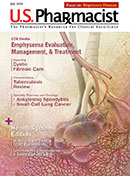Previous studies have suggested a correlation between psoriasis and imbalanced gut microbiome. Therefore, researchers theorized that the modulation of the gut microbiota with probiotics may enhance clinical outcomes, chronic inflammation, and cardiovascular risk factors in patients with psoriasis.
In a recent publication in the Journal of Drugs in Dermatology, researchers conducted a randomized, double-blind, placebo-controlled clinical trial involving 46 patients with psoriasis who were randomly assigned to receive probiotic capsules that contained at least 1.6 x 109 colony-forming units per gram of multistrain bacteria or placebo for 2 months.
The primary outcome measure was Psoriasis Area and Severity Index (PASI). The researchers also evaluated blood pressure readings; quality of life (QOL) as measured by short form (SF-36) survey, as well as assessed levels of proinflammatory cytokines such as highly sensitivity C-reactive protein (hs-CRP) and interleukin (IL)1-B; and lipopolysaccharides (LPS).
The results revealed that there were significant improvements in QOL in patients taking probiotics supplementation compared with the placebo group and PASI (-5.06 ± 2.10 vs. 0.30 ± 1.80, P = .049) as well. After the intervention, a significant decrease in serum LPS levels (-7.21 ± 10.33 vs. -2.74 ± 0.97 mmol/L, P = .010), hs-CRP levels (-1.67 ± 0.95 vs. -0.70 + 0.38 mg/L, P = .013), and IL1-B levels (-1.64 ± 1.10 vs. 0.17+ -0.20 mg/L, P = .043) was observed in the probiotics group.
The authors concluded, "This study shows that 8 weeks of probiotics supplementation results in significant improvement in psoriasis severity and patient-reported quality of life. Moreover, the daily consumption of probiotics for 8 weeks had beneficial effects on improving the inflammatory and oxidative stress status associated with psoriasis."
The content contained in this article is for informational purposes only. The content is not intended to be a substitute for professional advice. Reliance on any information provided in this article is solely at your own risk.
« Click here to return to OTC Update.






